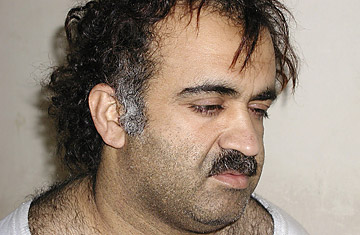
Khalid Sheikh Mohammed.
As the transcript portrays him, Mohammed spoke with a meandering elocution before three military officials, with no lawyer but an air force officer by his side serving as a "personal adviser." He came across as an earnest, somewhat chatty mass murderer taking credit for plans to detonate the Panama Canal as well as New York City landmarks like the stock exchange. He also mentions assassination plots directed at former Presidents Jimmy Carter and Bill Clinton as well as Pope John Paul II. Several of the conspiracies he cited, notably the one involving President Carter, have not previously been disclosed.
Are Mohammed's claims to be believed? He has long been described — notably in The 9/11 Commission Report — as prone to exaggeration and self-aggrandizement, fond of portraying himself as a "superterrorist." The notes to the Commission's conclusions mention the possibility of Mohammed "inflating his own role." He may also be attempting to defend his part in the 9/11 planning against the testimony of other terror suspects. The Commission's notes indicate that, according to another terror chieftain, Abu Zubaydah, Mohammed originally offered Osama bin Laden a more modest proposal for attacking the U.S., but that bin Laden reportedly berated him, saying "Why do you use an ax when you can use a bulldozer?" What's more, Mohammed has also used disinformation in the past. He admitted under previous interrogation that a list of 30 supposed U.S. targets, which he circulated shortly after 9/11, was a lie to exaggerate the scale of al-Qaeda's planning. Terrorism experts say that though there is no doubt Mohammed played a major role in planning 9/11, he's famous among interrogators for his braggadocio. "He has nothing else in life but to be remembered as a famous terrorist," says Bruce Riedel, Senior Fellow at the Saban Center at the Brookings Institute and a 29-year veteran of the CIA. "He wants to promote his own importance. It's been a problem since he was captured," says Reidel, who went on to say he wouldn't be surprised is Mohammed was exaggerating his role in other plots.
At one point in the transcript, Mohammed compares himself to revolutionaries like George Washington, and concedes that he is an "enemy combatant," his formal U.S. designation and a status that restricts his legal rights. If the British had arrested him during the Revolutionary War, Mohammed said, "for sure they would consider him enemy combatant." One of the ostensible reasons for the current Guantanamo hearings is to determine whether Mohammed and others can be held there indefinitely as "enemy combatants" prior to facing military tribunals that could sentence them death. The hearings at Guantanamo will process 14 "high-value" prisoners brought to Cuba last year shortly before President Bush announced the shut-down of the CIA's overseas secret prisons.
At another point in the transcript, Mohammed expressed regret for the deaths caused on 9/11, particularly those of children, noting, "I'm not happy that 3,000 been killed in America... I feel sorry even. I don't like to kill children and the kids." He added, "The language of war is victims."
The Pentagon also issued transcripts of hearings held for two other prisoners: Abu Faraj al-Libi, a Libyan who reputedly organized two bombings in Pakistan in December 2003 aimed at killing President Pervez Musharraf; and Ramzi Binalshibh, who is suspected of helping plan the 9/11 attacks as well as a failed scheme to crash planes into London's Heathrow Airport. Mohammed, who was captured in Pakistan in 2003, was the only one of the alleged terrorists to attend his own hearing. Al-Libi and Binalshibh refused to do so.
The hearings at Guantanamo, formally known as Combatant Status Review Tribunals, are being conducted without press to avoid the risk of releasing sensitive or classified information. The transcripts released yesterday were heavily redacted. Given that all the prisoners have been in U.S. custody for years, however, many critics believe that the U.S. wants to suppress details of the prisoners' interrogation, which could involve torture, or other mistreatment. Nevertheless, in his transcript, Mohammed alleges that he had been tortured.
The U.S. has also fought to keep secret the locations of CIA secret prisons where the prisoners including Mohammed were held for fear that any disclosure would greatly embarrass U.S. allies. Press reports have suggested that secret prisons were located in Poland, Thailand, Morocco, Jordan and other locations. Some 385 men are currently being held at Guantanamo; a hunger strike purportedly involving several dozen detainees protesting the conditions of their confinement has been going on for weeks, and possibly since January.
At a time when the Bush Administration is facing stiff criticism in a variety of domestic scandals as well as for its conduct of the Iraq war, Mohammed's confession has quickly become a focus of cable TV and other media coverage, a reminder of America's ongoing battle against international terrorism. But the attention focused on Mohammed, thought to be al-Qaeda's third-ranking leader, also underscores the fact that the terrorist organization's chief, Osama bin Laden, and his deputy, Ayman al-Zawahiri, remain at large at a time when their former Taliban protectors in Afghanistan are resurgent. With reporting by Brian Bennett/Washington
